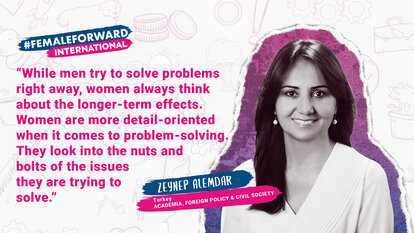#FEMALEFORWARDINTERNATIONAL
Meet Zeynep Alemdar from Turkey

The academic and civil society ‘motor’ advocating for more female participation in foreign policy decision-making.
Growing up in cosmopolitan Istanbul, Zeynep Alemdar always knew that our lives are affected by global events as much as they are affected by local incidents. That prompted her to seek a career in international relations, a field where she could apply both her big picture mindset and her problem-solving talent.
As an academic, but also a force in civil society, she is focused on bringing the female perspective forward in both local and global decision-making processes. Together with Dr Christina Bache and Rana Birden, two ladies from different fields but both with backgrounds in international relations, Alemdar founded Women in Foreign Policy in Turkey. This initiative’s goal is to showcase the critical importance of women in solving international conflicts and to give women a safe space to express their views.

Women’s approach to conflict solving
As professor Alemdar explains it, “We want to encourage women who are interested in foreign policy and provide them a space in which they can talk comfortably about solving international problems, learn from each other, learn from their role models, and bring different generations together”.
One example is their work to get Turkey to implement a national action plan based on UN Security Council Resolution 1325, which aims to empower women’s participation in conflict resolution, peacekeeping, and peacebuilding.
According to UN Security Council research, when women are involved in peace talks, the likelihood that a peace agreement will last longer than 15 years increases by 35%. There are real-life examples from such places as Liberia, the Philippines, and Burundi, where women’s civil society organizations stopped peace talks from being suspended and managed to get the men to agree with each other.

Women are more long-term and detail-orientated when it comes to problem-solving. They look into the nuts and bolts of the issues they are trying to solve. “Once you put women at the peace table, they look into the structural reasons for a war and try to find solutions”, she explains.
She points out that all the terms coined in international relations are usually laden with male values – hierarchy, frontiers, borders, power. Through their work in their NGO, they are trying to show what a feminist foreign policy could look like.
“Feminist foreign policy is about making women count in all foreign policy decisions. To make use of women's knowledge, of women's experience, and of women's intelligence in an area which has traditionally neglected women”, Alemdar explains.
The term feminist foreign policy was first coined by Margot Wallström, a former minister of foreign affairs of Sweden. It has already impacted policy actions and resource distribution. For example, countries like Sweden and Canada have started to prioritize women's organizations in development aid programmes while France and Mexico have begun to include more women in their diplomatic corps.

How to encourage more female representation
Professor Alemdar’s feminism has roots in her family. She grew up in a closely-knit family environment. Her parents had a very strong sense of justice and equality.
But even in the world of academia, she hits the glass ceiling every day. “It's never really directly pronounced, it's very subtle. If you call someone out on it, it will be rejected right away”, Alemdar says.
Her solution to this challenge is to work hard and strive to become a better version of herself.

But when it comes to closing the gap in terms of equality, Alemdar believes that to encourage more female participation in politics, women need good gatekeepers, namely male allies who would open the doors for them. Another key is female solidarity – women in power supporting and lifting each other up. And the third is quotas. “With numbers so low in terms of political participation, women need legal amendments to push them to the front”, Alemdar states.
This change is slowly happening, driven by brave, strong, and independent women like herself. “If you look at the protests all over the world – Black Lives Matter, Indian women fighting for their rights to property, climate change activists, etc. – It's very obvious that women are driving the change. And they are the ones who are challenging the traditional policies”, Alemdar concludes.

